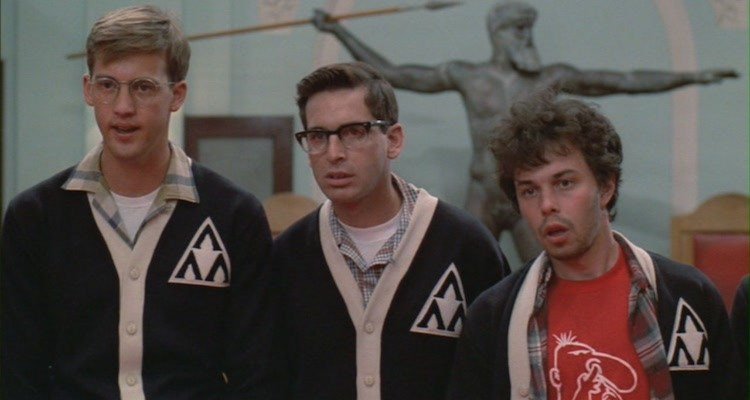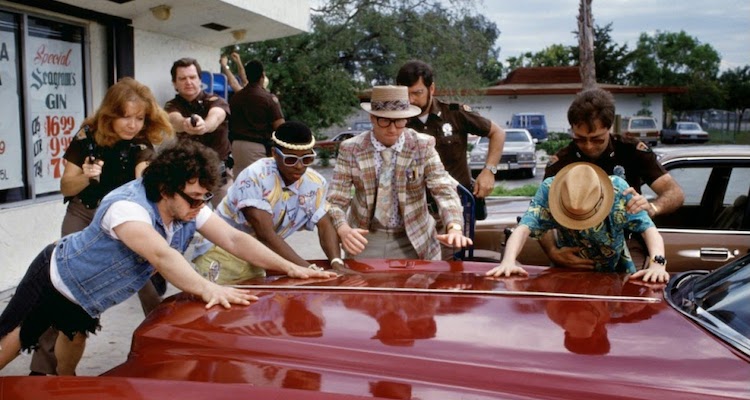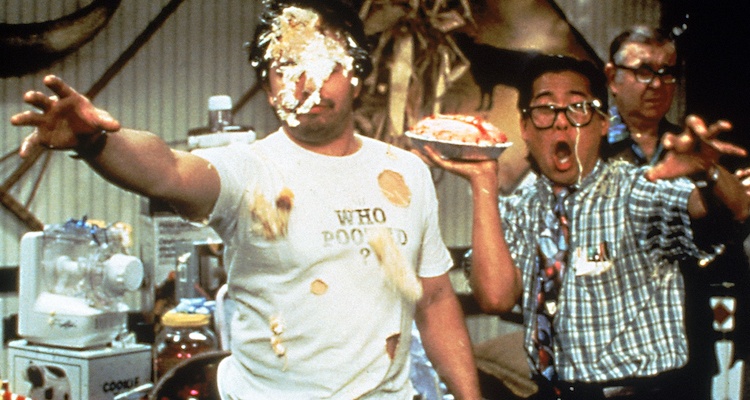There’s aging badly and then there’s Revenge of the Nerds. What passed for collegiate underdog hijinks in 1984 goes by different terms today — like rape, unlawful surveillance, and revenge porn. We’re supposed to cheer when Robert Carradine’s head nerd, Lewis Skolnick, beds a cheerleader who thinks he’s her quarterback boyfriend and wins her heart by being a more attentive lover. Legally speaking, that’s “rape by deception.” The good news for the nerds is that it’s still not a universally recognized crime. The bad news for the nerds is that the audience still can’t get behind their hero when he maybe rapes his crush.
When those plucky nerds out-fundraise those darn jocks by selling pies with naked pictures of the same cheerleader hidden at the bottom, we’re supposed to be laughing the trademark Nerd laugh (something like a snort while choking) alongside them. But we don’t. Because they just handed out compromising pictures of a young woman to an entire college campus. And how did they get such a picture? Like pimpled, perverted Hans Grubers, our enterprising heroes led a daring panty raid on her sorority as a clever distraction from the cameras they were also installing in the house. Then, they spend what must be at least 12 hours lying around their frat, watching the nubile coeds do all the things college movies like this think they do. Good for our boys, invading the privacy of a dozen women and committing a crime that should earn each of them at least a year in prison.
For a movie about nerds earning the respect they deserve, it makes a better case for the jocks trying to kick them off campus. Frankly, the geeky heroes embody more negative stereotypes of fraternities than the dim-bulb athletes do. Who would welcome a band of criminal misfits who spy on sororities and sell nude photos of their members at school functions? By complete accident, Revenge of the Nerds predicted the rise of Gamergate, Men’s Rights Activists, and the YouTube comments section — if a nerd feels disrespected, they’ll take it out on any woman who hasn’t yet blocked them.
But that’s a broad term, “nerd,” and it doesn’t really mean anything anymore. It means so little that misguided nerds police the nerd credentials of anyone they deem unworthy (women, mostly). Wal-Mart sells distressed tees for Star Wars, Star Trek and every major video game franchise. One of the biggest subscription boxes around sends a pile of ambiguously nerdy junk to your front door every month. It’s most telling that the last in-character appearance of Robert Carradine and Curtis Armstrong (the infamous Booger), shepherds of the franchise, was in King of the Nerds, a TBS reality show ordered as a companion piece to The Big Bang Theory, a ratings behemoth about socially awkward scientists that too many forum threads call “nerd blackface.”
Point is, there’s no membership requirement for being a nerd, and certainly less discrimination against nerdy folk than ever before. “Discrimination” might even be too heavy a word, though the rest of the Nerds franchise makes the case that it’s not heavy enough.
Revenge of the Nerds II: Nerds in Paradise (1987) is that rarest of sequels whose subtitle is also its entire plot. Most of your favorite nerds return, taking the fun on the road to Fort Lauderdale for a national fraternity convention. It’s the exact same movie, down to the implausibly elaborate musical number, with extra palm trees. If you forget most of the first one, Nerds in Paradise actually makes the gang sympathetic, but it takes an accidentally disastrous decision to pull it off. Removed from a college campus, a zeroes-versus-heroes conflict doesn’t make much sense. That’s why there’s no Animal House 2000 where John Blutarsky raises his trademark hell on the campaign trail. That’s why American Pie started following different (cheaper) casts of characters still in college. It’s hard to imagine and harder to portray nerds getting bullied outside of school.
“I don’t want nerds in this hotel!” the upper-crust manager declares to his concerned underling. Admittedly, he is a former member of the jock frat. But he’s still an adult, who admits he’d rather lose money on an unsold room than rent it to nerds. It may only seem like a goofy byproduct of ‘80s teen comedy exaggeration, but the follow-up takes it farther.
Revenge of the Nerds III: The Next Generation (1992) takes the franchise into the fuzzy PG world of TV movies and freely equates nerd discrimination with homophobia. Robert Carradine returns as Lewis Skolnick — excuse me, Lew Skolnick. See, he’s not a nerd anymore. He grew out of that phase. He’s all about ponytails and cell phones the size of meatball subs now. Lew even derides his college-bound nephews (the titular next generation) as nerds.
Meanwhile, Ted McGinley’s alpha male cop, Stan Gable, returns from the first movie as one of several unnecessary commitments to continuity, becoming the new Dean of Students despite a complete lack of qualifications. His mission: eliminate the new nerds and steal Lew’s wife, played by Julia Montgomery, reprising her role as the cheerleader he kind of raped in the original.
The plot progresses exactly as you’d expect — the young nerds are harassed, old white guys hate them, a 100% renewable form of celery-based ethanol is casually invented in a montage. But it’s Lew’s plot that gets interesting/uncomfortable. When former foe Gable deceptively befriends him, Lew is giddy at the acceptance. But his wife (and later his best friend Booger) tries everything to appeal to his true, buried self. When he does finally see the light, he retrieves his nerd gear from a dusty, hidden closet and comes out, pocket protector and all. And I do mean he comes out. Lewis announces on the radio that he is, in fact, a nerd. He talks of the “systematic elimination of nerd culture,” calls for a nerd protest and appeals to any non-nerds with nerd family members. Then Villainous Old White Guy demands Lew and anyone like him be yanked off the air. And the police actually drag them out of the radio station.
But the line that seals the deal, proving that the writers knew exactly what they were doing, comes almost immediately after. Villainous Old White Guy’s receptionist walks into his office and say she’s leaving to support the protest. When he reminds her she isn’t a nerd, she replies, “No, but my son is, and whatever he is or wants to be, I support him 100%.” The movie then reveals, to the bad guys’ surprise, just how integrated nerds are into society. When they go on strike, every industry falls to its knees. The remaining workers put their hands up in lazy, inoffensive neutrality. A gas station owner (an uncredited Clancy Brown, somehow) tells Villainous Old White Guy, “I got no feeling for ‘em one way or the other.”
And then there’s the finale. Lewis goes to trial for a crime he did not commit, and Gable takes the stand. He boldly admits that all of his nerd hatred was actually self-hatred, because he never wanted to admit he was a nerd in a non-nerd’s body. It’d almost be admirable if one of the few characters to appear in every Nerds installment wasn’t a staggering gay stereotype. It’s an uncomfortable equation that a comedy so slipshod can’t possibly make into anything more than a reductive joke. That’s all to say nothing of the casual racism that’s plagued the series since it introduced a revolving door of Asian stereotypes.
Lucky for us, Revenge of the Nerds IV: Nerds in Love (1994), a loose remake of Guess Who’s Coming to Dinner, says plenty. Unlike III, which doesn’t get queasy until an hour in, IV hits the ground stumbling. See, Booger is engaged to a high-society woman with a family to match. Her mother faints upon seeing him. Her father asks if he came from money, scoffs because he didn’t. Her brother says the dreaded n-word — nerd — and the whole family gasps. He adds with what can only be described as an ‘80s-Creep-Sneer (this movie came out in 1994) that he can “smell them a mile away.” Her mother weakly offers that she heard nerds make “good husbands.”
Now entirely removed from a college setting, the only way to maintain a plot about nerd discrimination is to paint them as genuine second-class citizens in the eyes of the closed-minded. It’s a fantasy that never remotely approaches believability, especially when the Stuck-Up Dad assumes his daughter is only marrying a nerd for “revenge” or because she’s pregnant, and offers to buy her therapy to fix what must be a mental deficiency.
Nothing greater illustrates the problems of Nerds in Love than when the Chairman of the Republican Party arrives. He watches in quiet horror as these lowlife nerds swarm around him, like another species entirely. He only forces himself to stay when Stuck-Up Dad reminds him that even nerds vote. But in this scene, his bug-eyed discomfort is justified. One nerd presses his bare ass against a picture window. Others compete in a hotly spectated burping contest.
If the Nerds franchise has an Achilles heel, it’s a repeated failure to paint the nerds as heroically as they’re clearly supposed to be. It turns toxic in IV only because it calls on racism, yet provides plenty of valid reasons to discriminate against nerds. In perhaps the baldest exposition dump ever aired on network television, Lewis Skolnick tells Booger the plots of the other three Nerds movies, all of which Booger was present for, in a passionate plea against “the yoke of nerd oppression.” Why is he having this conversation? Because the nerds started a food fight at Booger’s bridal shower. By the time the scheming brother frames Booger for having an illegitimate child and Stuck-Up Dad discovers how to satisfy his wife with a few tips from the nerds, you wonder what was intentional and what was catastrophically accidental.
Nerds in Love ends as all Nerds movies do, with everyone accepting who they are. Not even the additions of 3-D, Aroma-Vision or Al Bundy doing the commercials can save the final chapter of the Nerds saga from itself.
Because nerds forever thirst for vengeance, they did reboot Revenge of the Nerds. Or tried to. The Adrien Brody-produced attempt was cancelled in 2006 when Emory College decided it didn’t approve of the script several weeks into production. Shut down by those darn jocks yet again. But looking at the franchise, it was probably for the best. The original movie lives on as a downbeat curio — “But have you seen it recently?” — and the sequels don’t live on at all. Revenge of the Nerds II, III and IV aren’t as watchably shocking as the first, but they commit just as many lazier sins of their own.
Jeremy Herbert lives in Cleveland, which also has not aged well.






